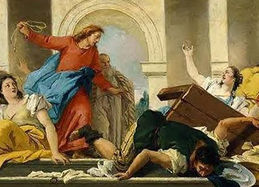Template:Messiah: Difference between revisions
No edit summary |
No edit summary |
||
| Line 1: | Line 1: | ||
[[File:moneychange.jpg|right|259px|thumb|The King of Judea had the right to fire the porters of the temple. What was Jesus doing with a string whip and the [[moneychangers]]? Was it an act of violence or was Jesus just doing his job as king? Why did Jesus condemn the [[Corban]] of the [[Pharisees]]? What is the meaning of [[Mammon]] and why is there a [[righteous]] an unrighteous mammon? What is the [[wages of unrighteousness]]? <Br>We need to understand that the Messiah's role and the relationship the people have with him. We know there are ''false christs'' .<Ref>'''christ''' in the Greek is the same as ''massiahs'' in the Hebrew, translated anointed in English.<Br>[[Matthew 24]]:24 "For there shall arise false Christs, and false prophets, and shall shew great signs and wonders; insomuch that, if [it were] possible, they shall deceive the very elect." | |||
<Br>[[Mark 13]]:22 "For false Christs and false prophets shall rise, and shall shew signs and wonders, to seduce, if [it were] possible, even the elect."</Ref> How do we know if they believe in the real Christ or a false image of Christ created by [[false religion]]?]] | |||
== Christ means Messiah == | == Christ means Messiah == | ||
Revision as of 15:07, 1 October 2021

We need to understand that the Messiah's role and the relationship the people have with him. We know there are false christs .[1] How do we know if they believe in the real Christ or a false image of Christ created by false religion?
Christ means Messiah
The word Christ from the Greek word Christos[2] means anointed. The word mashiyach[3] from the word mashach[4] also means anointed and is translated Messiah in Daniel but normally it is seen as the word anointed.
This is what Israel did to their kings.
They anointed kings.
King David was a Messiah, a Christ, and the anointed king.
Jesus was the highest son of David which means he was the king. Every time he is called Christ He is being called the anointed king, the Messiah.
As both King and High priest Jesus was able to take the kingdom of God from the apostate Levites who followed the way of the Pharisees and their Corban which made the word of God to none effect and appoint that Kingdom of God to the early Church who would bear fruit worthy of repentance.
- ↑ christ in the Greek is the same as massiahs in the Hebrew, translated anointed in English.
Matthew 24:24 "For there shall arise false Christs, and false prophets, and shall shew great signs and wonders; insomuch that, if [it were] possible, they shall deceive the very elect."
Mark 13:22 "For false Christs and false prophets shall rise, and shall shew signs and wonders, to seduce, if [it were] possible, even the elect." - ↑ 5547 ~Χριστός~ Christos \@khris-tos’\@ from 5548; adj AV-Christ 569; 569 Christ =" anointed"
- 1) Christ was the Messiah, the Son of God
- 2) anointed
- ↑ 04899 ^חישׁמ^ mashiyach \@maw-shee’- akh\@ from 04886, Greek 3323 ~Μεσσιας~; n m; AV-anointed 37, Messiah 2; 39
- 1) anointed, anointed one
- 1a) of the Messiah, Messianic prince
- 1b) of the king of Israel
- 1c) of the high priest of Israel
- 1d) of Cyrus
- 1e) of the patriarchs as anointed kings
- 1) anointed, anointed one
- ↑ 04886 ^חשׁמ^ mashach \@maw-shakh’\@ a primitive root; v; AV-anoint 68, painted 1; 69
- 1) to smear, anoint, spread a liquid
- 1a) (Qal)
- 1a1) to smear
- 1a2) to anoint (as consecration)
- 1a3) to anoint, consecrate
- 1b) (Niphal) to be anointed
- 1a) (Qal)
- 1) to smear, anoint, spread a liquid